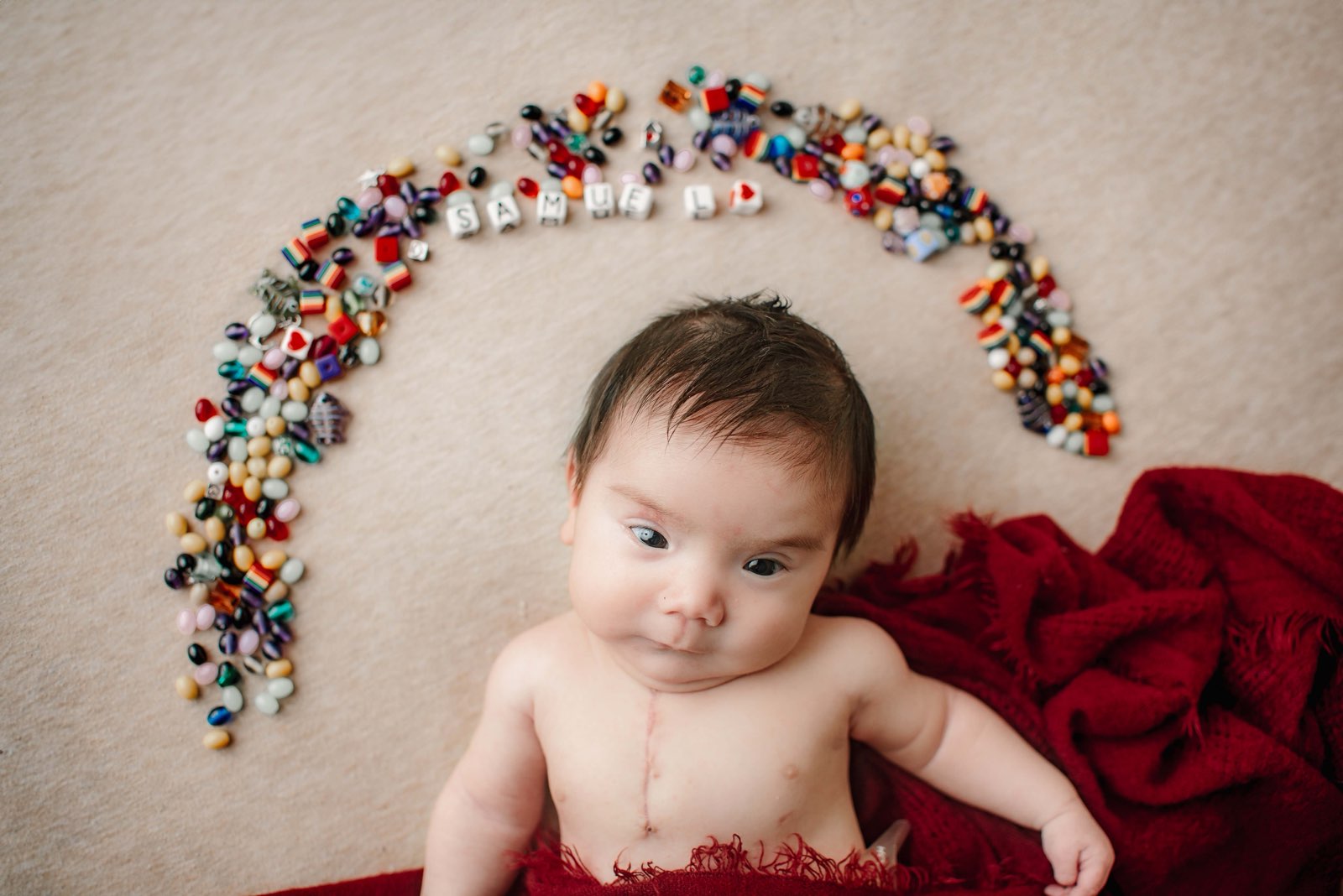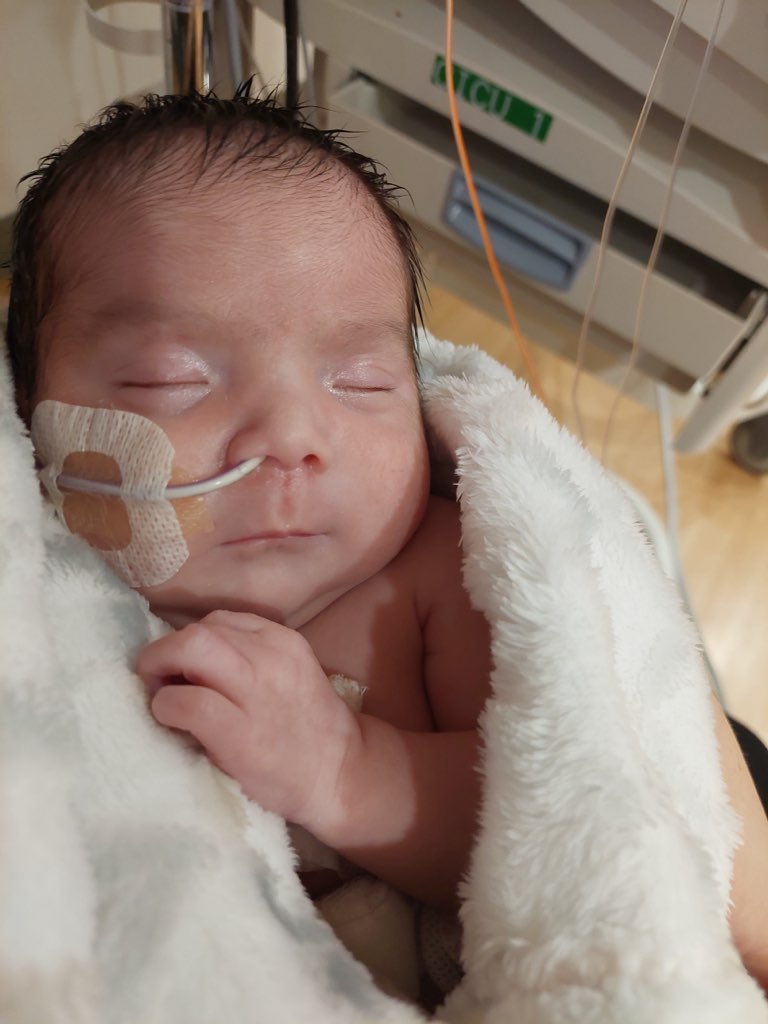Samuel's heart full of hope: Overcoming congenital heart defects at Children's Hospital New Orleans
- Posted on:

"What is, will be. And what will be, will be." This simple mantra was a source of strength for Samantha Franco throughout her pregnancy, during her son Samuel's open-heart surgery at just six days old, and the challenging weeks that followed until they could finally go home after almost two months in the hospital.
Samuel, a young patient at Children's Hospital New Orleans, faced a daunting medical journey early in his life. He was diagnosed with multiple congenital heart defects, including a ventricular septal defect (VSD), aortic arch obstruction and atrial septal defect (ASD). These conditions required complex and delicate heart surgery.
Under the skilled hands of Dr. Frank Pigula, Chief of Pediatric Cardiothoracic Surgery and Co-Director of The Heart Center, Samuel underwent surgery to repair the VSD, partially close the ASD and correct the aortic arch obstruction. This critical intervention was more than just a medical procedure; it was a source of hope for Samantha and Manuel, showcasing the advances in pediatric cardiac care and the expertise at Children's Hospital New Orleans. 
Samantha and Manuel welcomed their second child, Samuel, with excitement and optimism, especially after their first child was born through in vitro fertilization, or IVF. This time, the natural conception of Samuel seemed like a miracle. However, their excitement soon turned into apprehension when a routine anatomy scan at six months into the pregnancy hinted at possible heart complications.
The challenge intensified when ultrasound technicians struggled to get a clear view of Samuel's heart, prompting a referral to a specialist. Amid these consultations, the term "double right outlet ventricle" emerged – a diagnosis the Francos had never encountered before. Living midway between New Orleans and Mobile, Alabama, the Francos found themselves conveniently close to Children's Hospital New Orleans, known for its specialized care and capability to support families from a wide region.
During their visits to Children’s Hospital New Orleans, the Francos consulted with Dr. Shannon Powell, whose expertise in fetal heart conditions and comprehensive examination refined Samuel's diagnosis to a ventricular septal defect and highlighted concerns with his aortic arch. "Our aim is to provide families with clear, understandable information to navigate their child's condition," Dr. Powell said. "By breaking down complex diagnoses into manageable terms, we strive to empower parents to make informed decisions about their child's care."
This period was marked by significant questions about Samuel's immediate future: "We remember asking ourselves: 'Would immediate open-heart surgery be necessary upon his birth, or could we wait a few months for him to grow stronger?' We faced the delivery with a profound uncertainty," Samantha recalls, highlighting the looming question that shadowed the final stages of her pregnancy.
Upon Samuel's birth, the transition to Children’s Hospital New Orleans was swift and seamless, thanks to the hospital's dedicated transport team. Despite being separated from her son during this sensitive time, Samantha found comfort in the knowledge that Samuel was in the capable hands of specialists prepared to address his complex needs. As the family rallied together, they drew strength from the expertise and care provided by the team at Children’s Hospital New Orleans's Heart Center and Neonatal Intensive Care Unit.
As Samantha and Manuel Franco faced the complexities of Samuel's congenital heart defects, they found themselves at a critical juncture in their son's health journey. Dr. Frank Pigula and the cardiology team focused on preparing Samuel for the significant heart surgery, while a separate medical team addressed an urgent digestive system issue to ensure Samuel's stability and readiness for the heart surgery that was to come. 
Just six days after birth, Samuel underwent a six-hour open-heart surgery. Samantha recalled finding Dr. Pigula's explanation of the surgery incredibly reassuring. His confidence and clear detailing of each step made the daunting process seem manageable. Dr. Pigula outlined the entire surgical strategy, which included repairing the VSD, partially closing the ASD and correcting the aortic arch obstruction. The family noted that his calm and approachable demeanor significantly eased their anxieties throughout the process.
"Successfully managing congenital heart defects requires meticulous planning and precision in surgical execution," Dr. Pigula explained. "In cases like Samuel's, our strategy encompasses not only immediate corrective measures but also anticipates the child's future health needs. Utilizing techniques that are both proven and innovative, our goal is to ensure an optimal outcome for each child's unique condition, laying a solid groundwork for their continued growth and health."
It's particularly notable that Samuel needed just one surgery, while many children with similar heart conditions often need several. The Franco family was well-informed about what to expect and received constant updates and support from the medical team, giving them comfort throughout the process.
By addressing the heart conditions early in Samuel's life, the medical team not only improved his heart function but also set a foundation for better health as he grows. The complexity of Samuel's case highlights the critical role of specialized pediatric cardiac care in managing and treating congenital heart defects.
Understanding Samuel's heart conditions
Here's a closer look at the conditions he faced and the implications of the procedures performed:
Ventricular septal defect: A condition where there is a hole between the two lower chambers of the heart. This defect allows oxygen-rich blood to mix with oxygen-poor blood, causing the heart to work harder. Repairing a VSD involves closing this hole, typically with a patch, to prevent the mixing of blood and to ensure the heart can function more efficiently.
Aortic arch obstruction: This condition involves a narrowing of the aorta, the major artery that carries blood from the heart to the rest of the body. An obstruction can significantly reduce blood flow, putting stress on the heart and potentially leading to serious health issues. Repairing the aortic arch requires precise surgical techniques to remove the narrowing and reconstruct the aorta, ensuring proper blood flow.
Atrial septal defect: Similar to a VSD, an ASD is a hole, but it's located between the heart's two upper chambers. This defect also allows the mixing of oxygen-rich and oxygen-poor blood. Partial closure of an ASD involves either sewing the hole closed or placing a patch over it, which helps normalize the flow of blood through the heart.
In the aftermath of Samuel's surgery, he was removed from chest tubes and extubated within 24 hours of his surgery, defying common challenges associated with his condition. "He was doing so well that, against the usual difficulties faced by babies with congenital heart defects, Samuel began feeding within 1.5 to 2 weeks post-surgery," Samantha said. "That was such a blessing not just for his recovery but also for our ability to bond."
Finally, just before Thanksgiving 2023, the Franco family brought Samuel home for the first time, marking a new chapter in their journey. Samuel was seven weeks old.
As Samuel continued to grow and recover, the Franco family adjusted to their new routine, which includes regular check-ups with their local cardiologist only 20 minutes away. The ongoing care at Children's Hospital New Orleans also plays a crucial role in Samuel's health, especially with upcoming treatments like a balloon procedure for his narrowing aortic arch. Moreover, Samuel and his family have bravely navigated additional challenges, such as a stomach bug and rhinovirus, which affected his lungs and required breathing treatments when he was just two-and-a-half months old.
Genetic testing also revealed that Samuel has Klinefelter syndrome, carrying an extra X chromosome (XXY), introducing potential future obstacles. This diagnosis adds another dimension to Samuel's medical and developmental journey, which the Francos are prepared to navigate with the support of the Children's Hospital New Orleans team.
Samantha shared some heartfelt advice for families battling congenital heart defects, emphasizing the power of knowledge and advocacy: "You may never feel fully ready or prepared for the challenges that lie ahead, but arming yourself with information, asking the right questions and standing up for your child are crucial," she advises. "Taking an active role during hospital rounds, asking for explanations until you understand every aspect and ensuring you're there for your child at every moment can profoundly impact their recovery. Remember, your love, presence and understanding are their greatest sources of strength. Together, with the medical team's expertise, you form an unbeatable team fighting for your child's health."
Every step forward in Samuel's health is a testament to the expertise and dedication of the medical team at Children's Hospital New Orleans and a reminder of the importance of forming strong partnerships with families and care teams. As they look to the future, the Franco family remains optimistic, ready to face whatever comes their way with the support of their medical team and the community around them.
The Children's Hospital New Orleans Heart Center is at the forefront of pediatric heart care, combining cutting-edge technology with compassionate, family-centered approaches. Our dedicated team of specialists is committed to providing comprehensive care for children with congenital heart defects, from diagnosis through to treatment and beyond.
For families facing similar challenges, learn more about Children’s Hospital New Orleans’ specialized care and advancements in treating congenital heart defects, visit the www.chnola.org/services/heart-center/



